Abstract
We have isolated from human erythrocyte ghosts a fraction which prevents the attachment of unheated as well as heated lipopolysaccharides of gram-negative bacteria to red cells. This material has no significant inhibitory effect either toward the Vi antigen of gram-negative bacteria or towards the group and common antigens of the gram-positive bacteria investigated. We, therefore, named this fraction “lipopolysaccharide receptor.” The receptor interacts with lipopolysaccharides and not with erythrocytes, it forms complexes with and blocks those groupings of lipopolysaccharides which attach to red cells. The effect of the receptor is physical and not enzymatic. The interaction of the receptor with the lipopolysaccharides is reversible, and the receptor removes lipopolysaccharides fixed to red cells. An equilibrium of lipopolysaccharide distribution between cells and receptor is established when receptor-lipopolysaccharide complexes are incubated with red cells. The receptor is labile toward heat and deviation of the hydrogen ion concentration from neutrality; aldehydes destroy its inhibitory activity.
Full text
PDF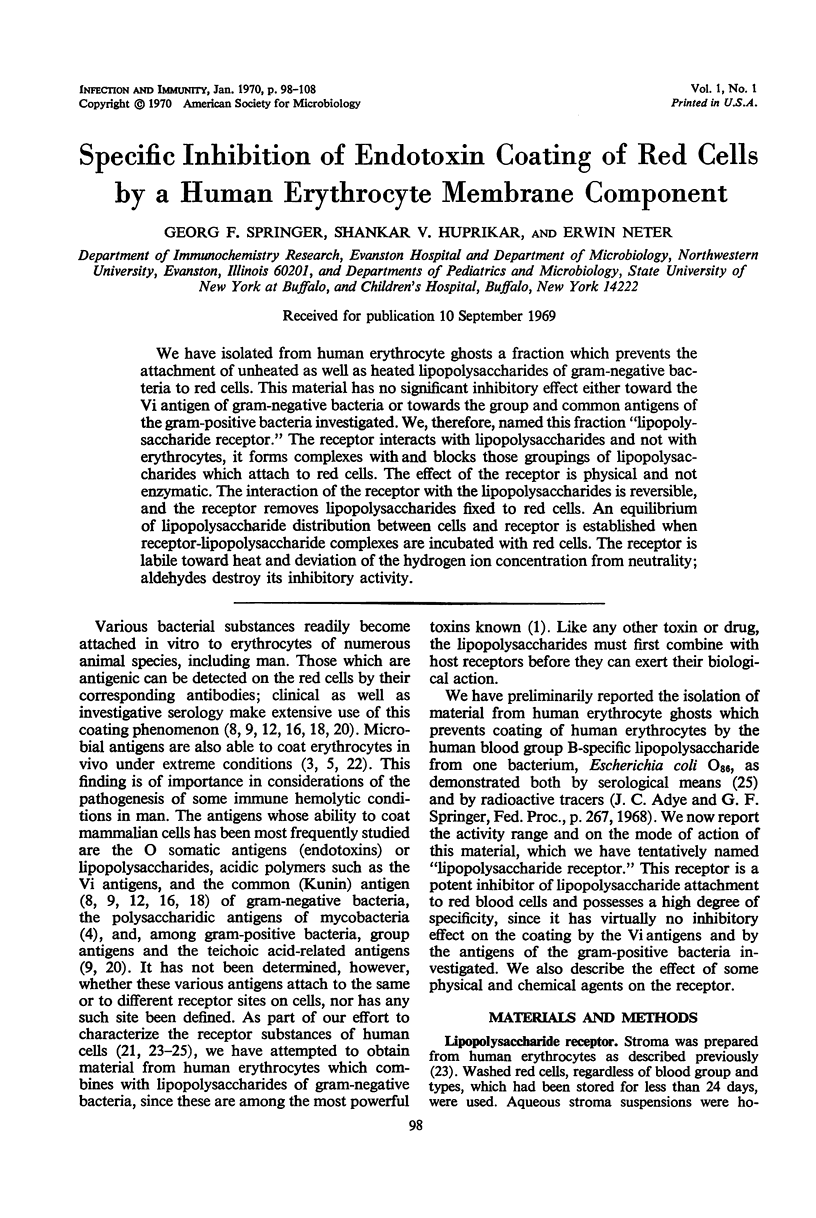
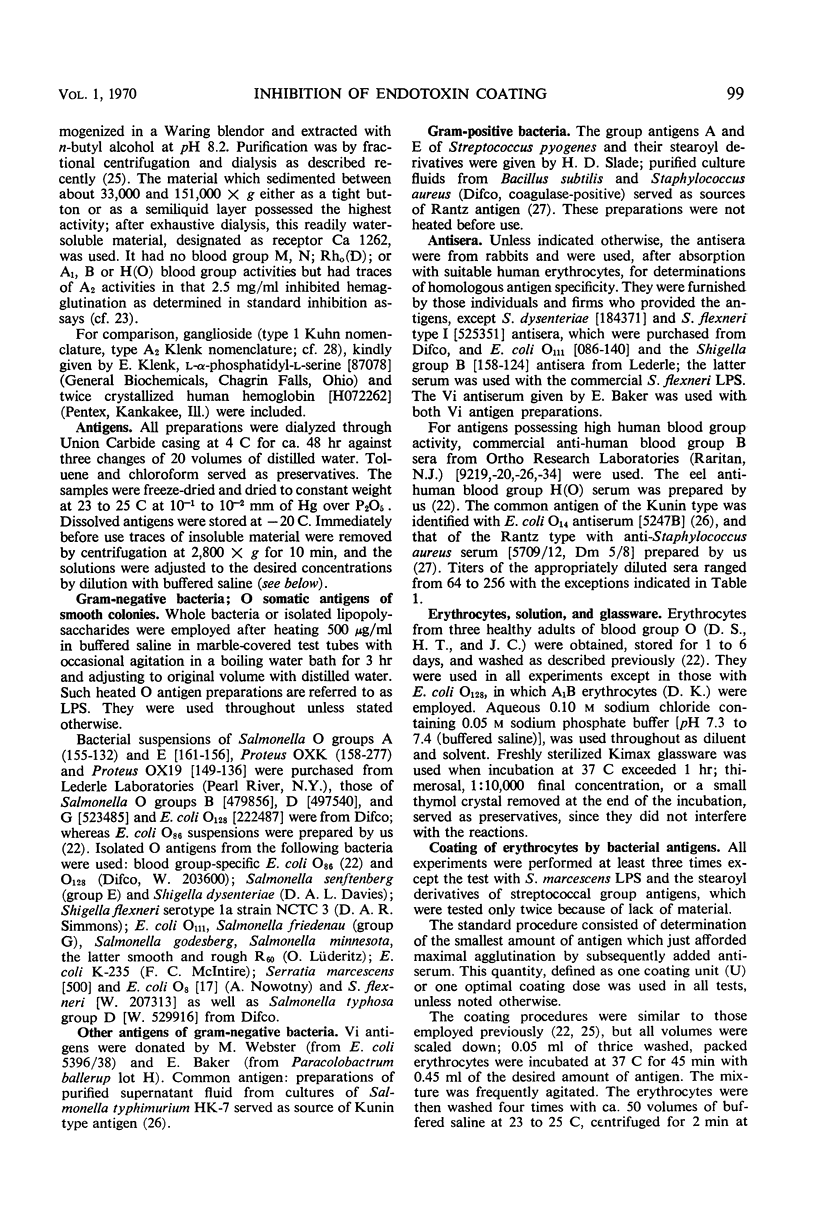
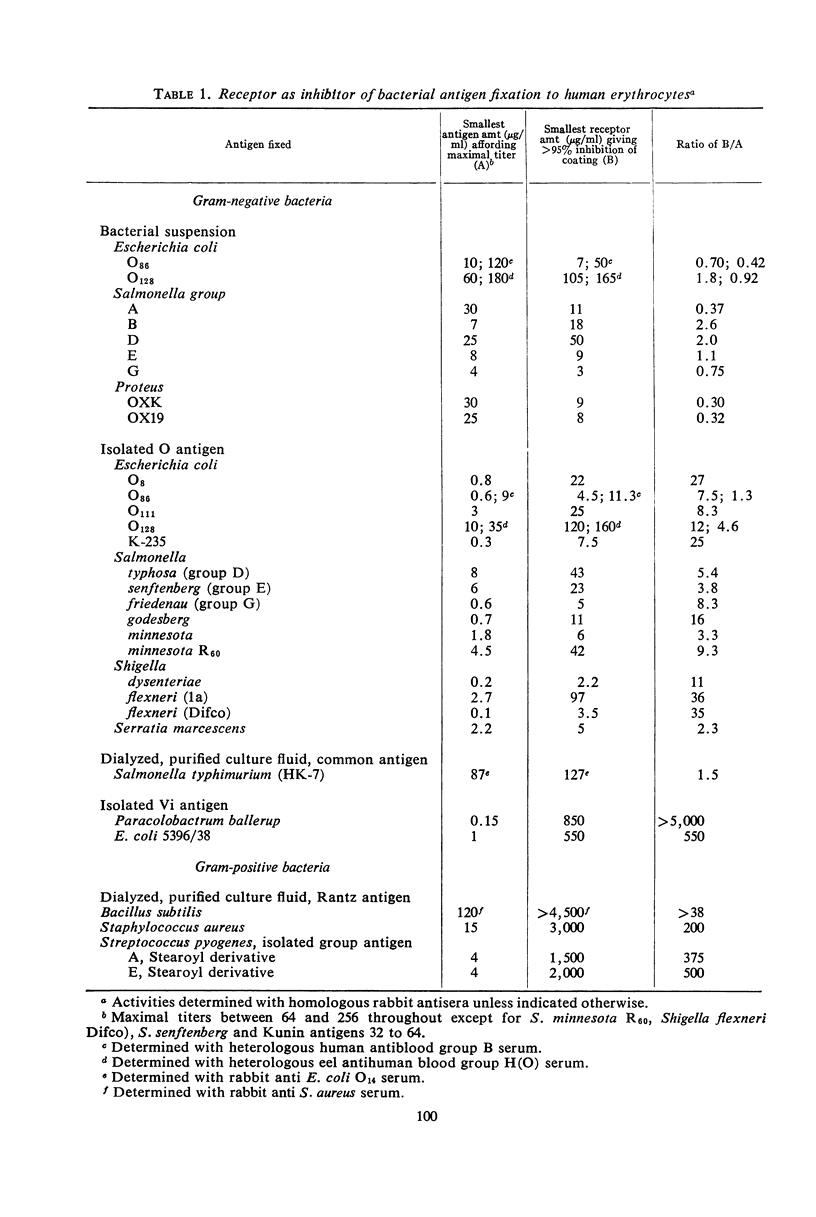
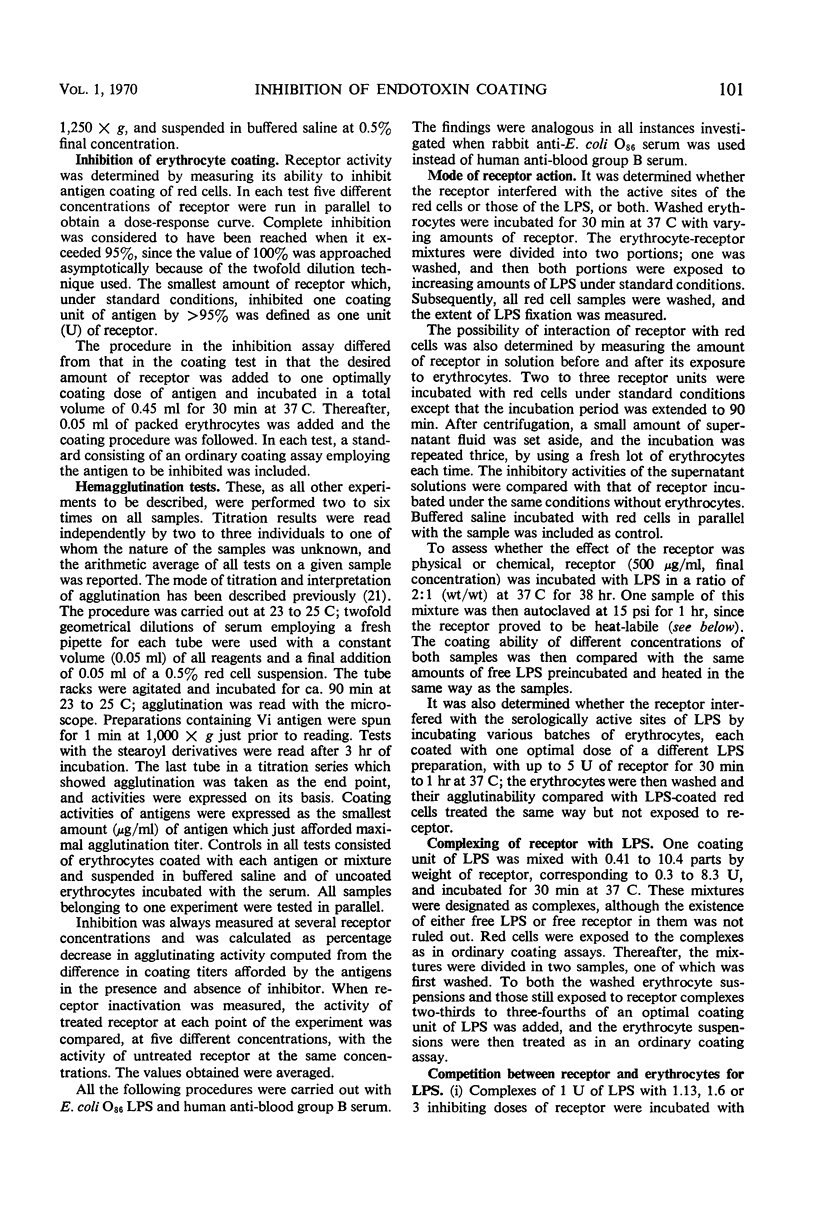
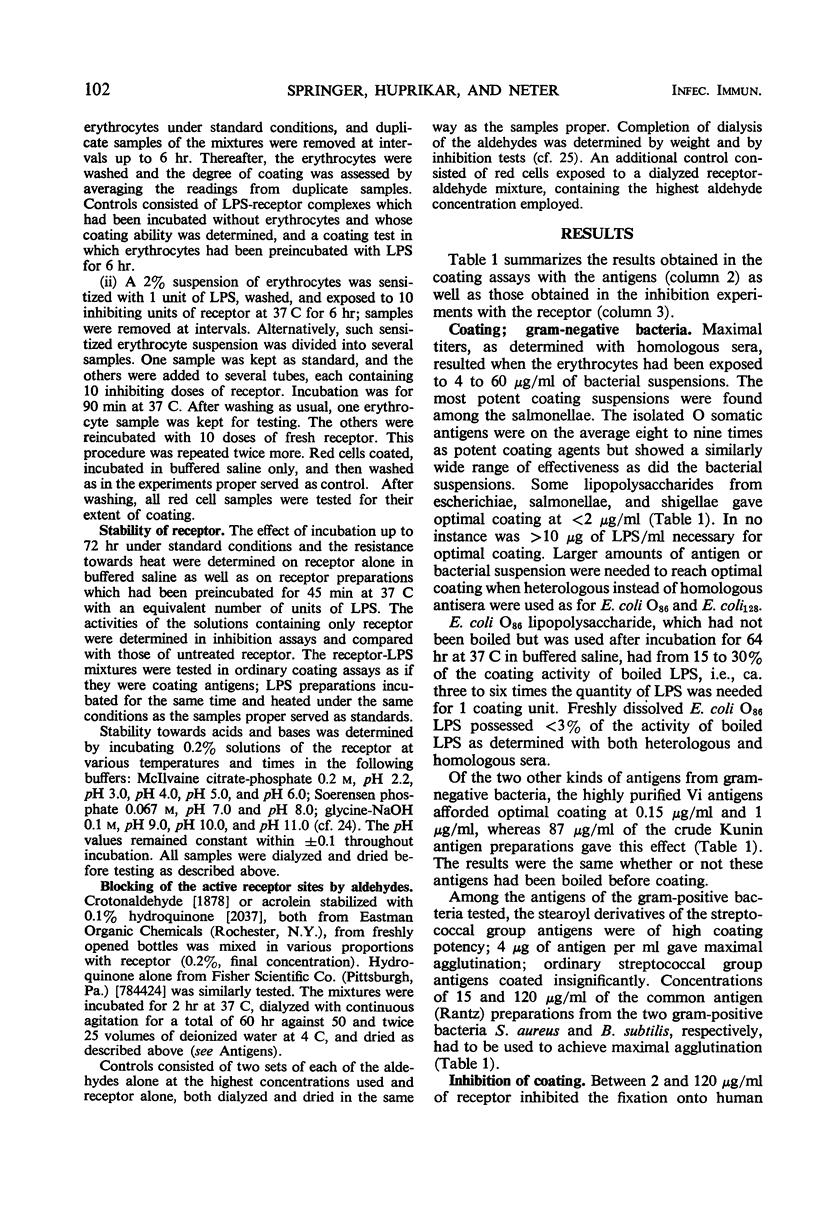
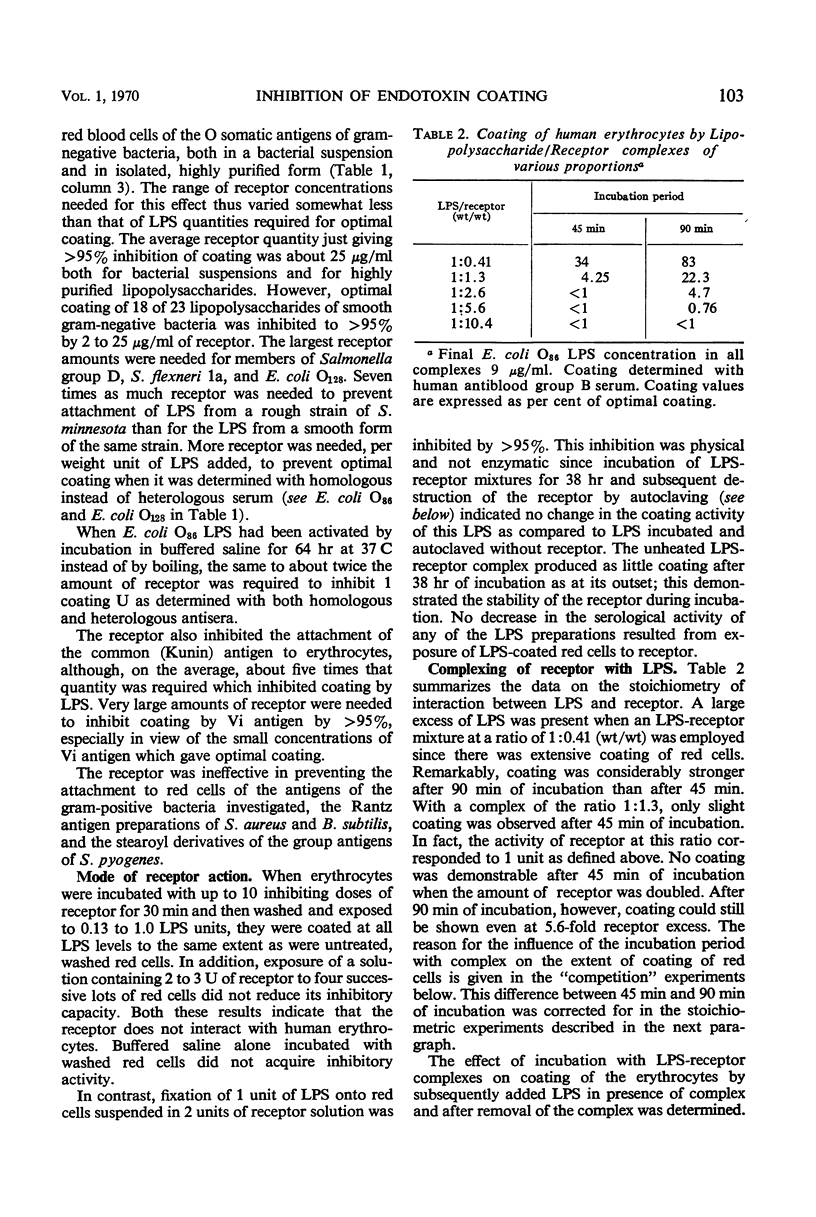
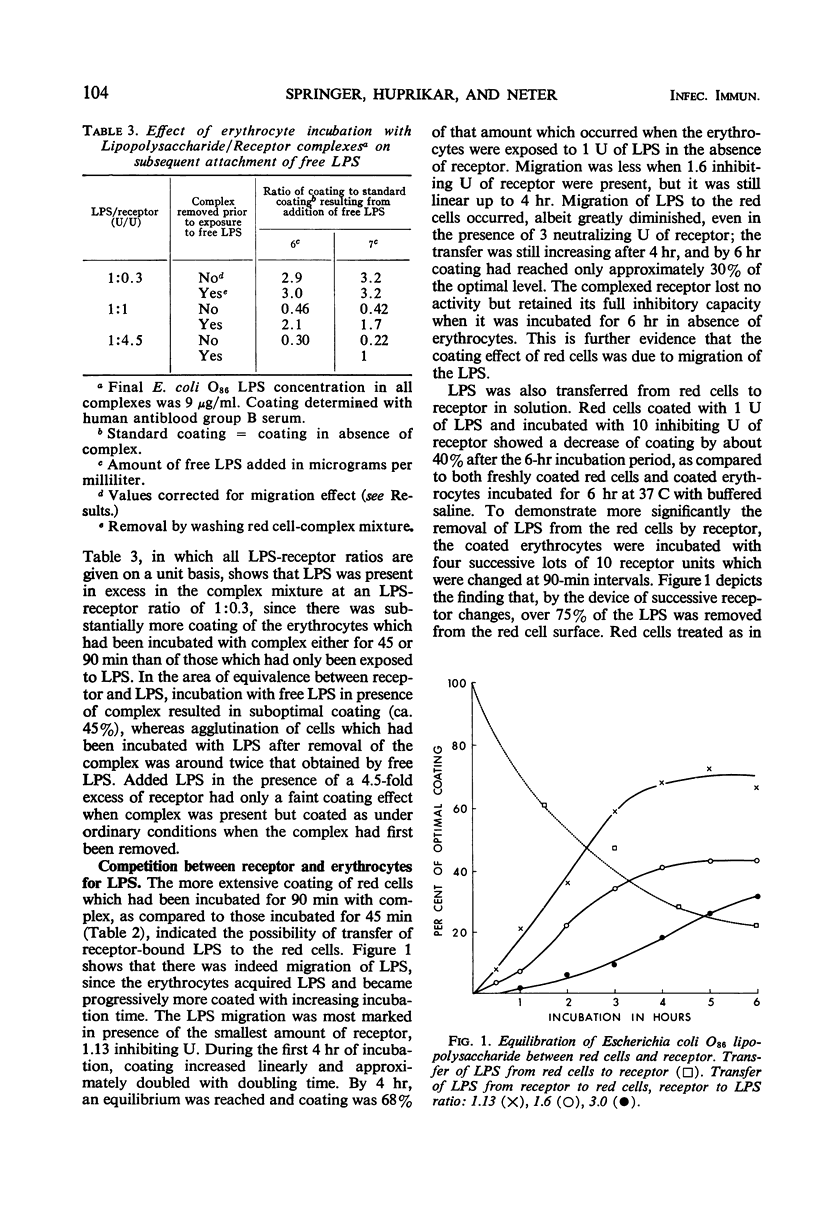
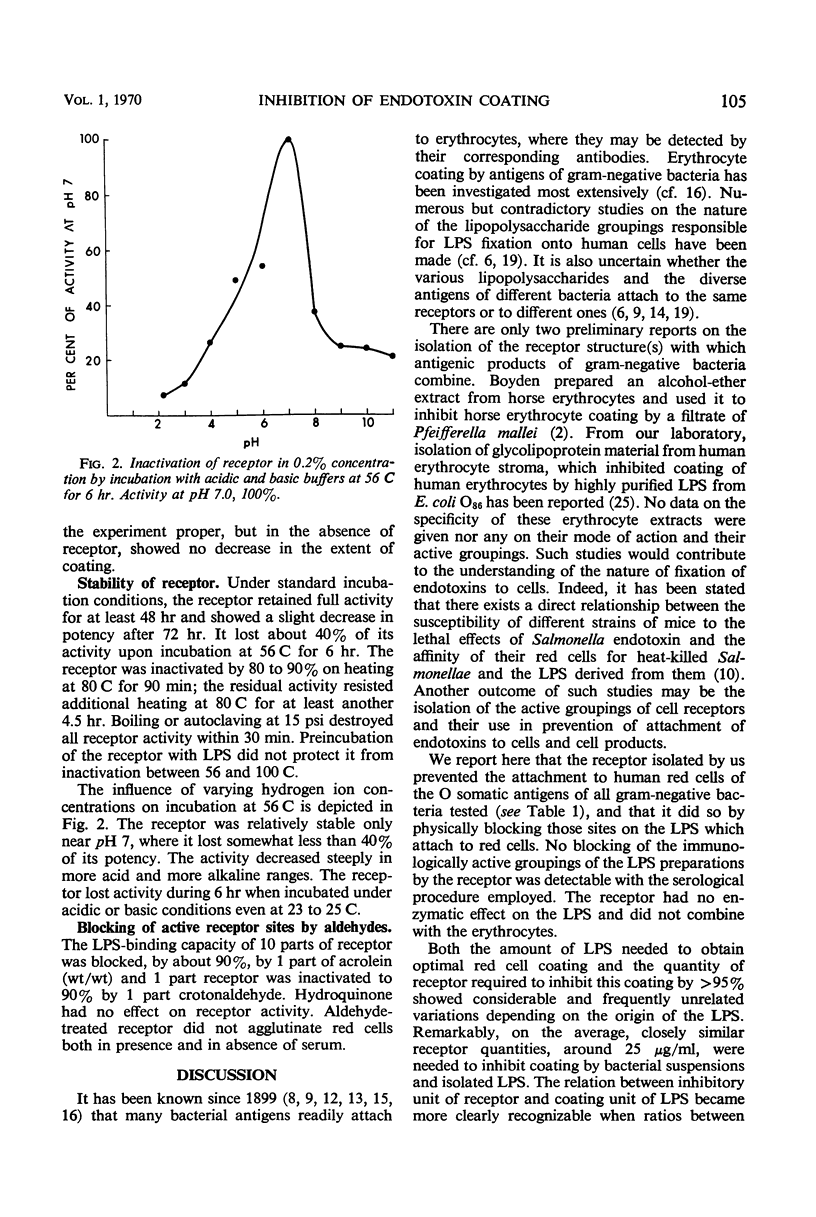
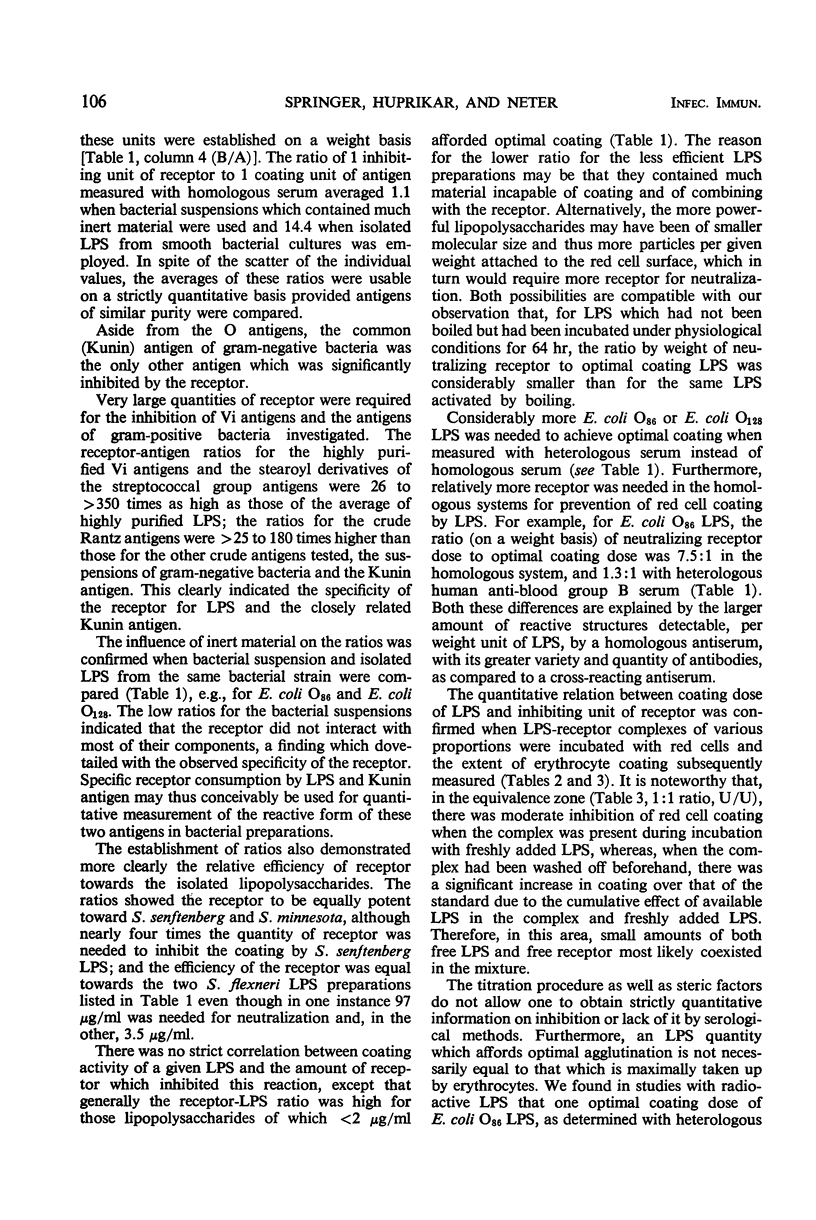
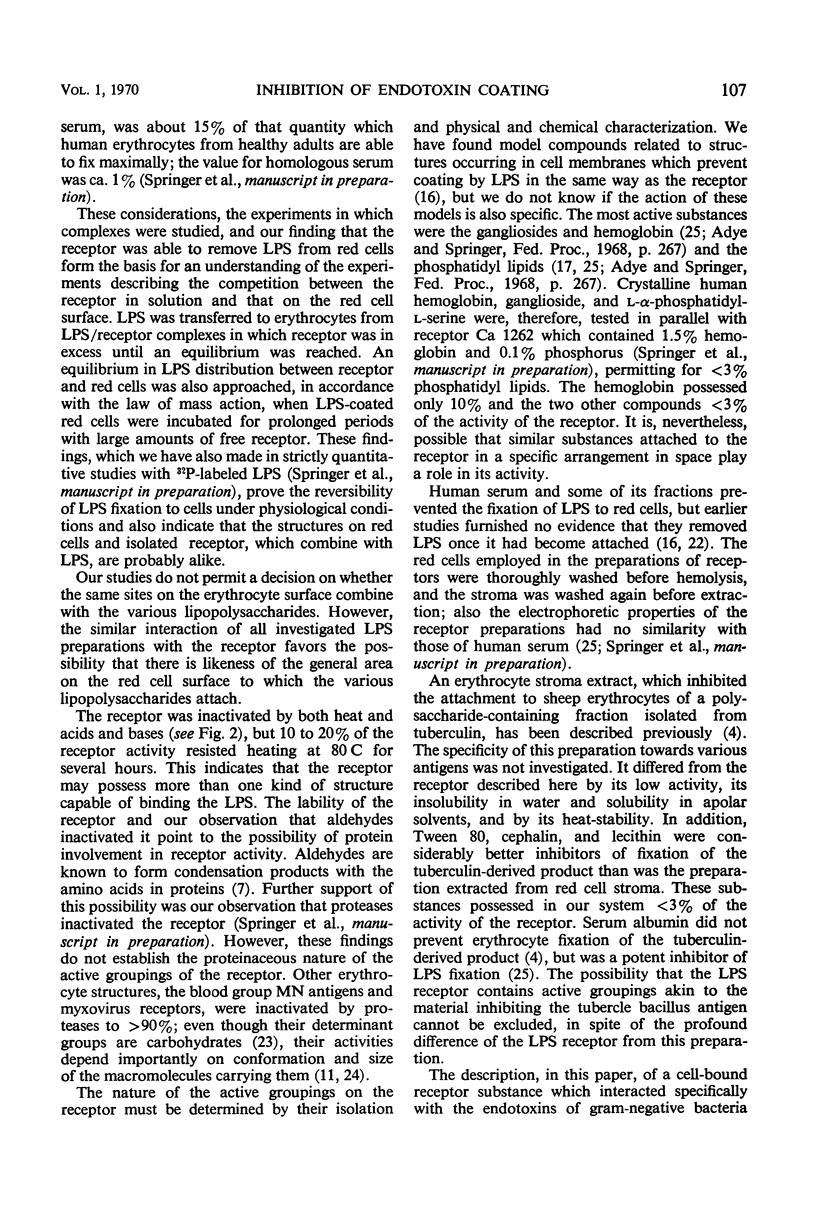
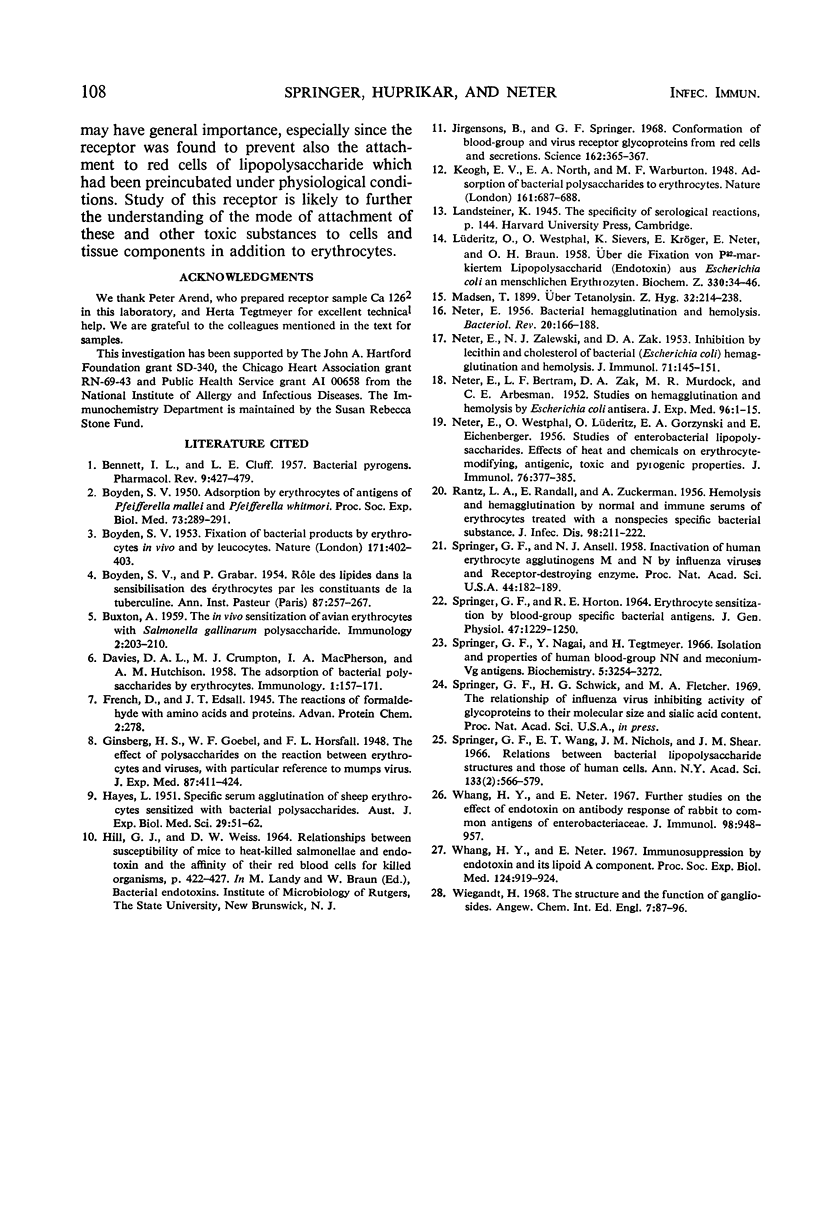
Selected References
These references are in PubMed. This may not be the complete list of references from this article.
- BENNETT I. L., Jr, CLUFF L. E. Bacterial pyrogens. Pharmacol Rev. 1957 Dec;9(4):427–479. [PubMed] [Google Scholar]
- BOYDEN S. V. Fixation of bacterial products by erythrocytes in vivo and by Leucocytes. Nature. 1953 Feb 28;171(4348):402–403. doi: 10.1038/171402a0. [DOI] [PubMed] [Google Scholar]
- BOYDEN S. V., GRABAR P. Rôle des lipides dans la sensibilisation des érythrocytes par les constituants de la tuberculine. Ann Inst Pasteur (Paris) 1954 Sep;87(3):257–267. [PubMed] [Google Scholar]
- BUXTON A. The in vivo sensitization of avian erythrocytes with Salmonella gallinarum polysaccharide. Immunology. 1959 Jul;2:203–210. [PMC free article] [PubMed] [Google Scholar]
- DAVIES D. A., CRUMPTON M. J., MACPHERSON I. A., HUTCHISON A. M. The adsorption of bacterial polysaccharides by erythrocytes. Immunology. 1958 Apr;1(2):157–171. [PMC free article] [PubMed] [Google Scholar]
- HAYES L. Specific serum agglutination of sheep erythrocytes sensitized with bacterial polysaccharides. Aust J Exp Biol Med Sci. 1951 Jan;29(1):51–62. doi: 10.1038/icb.1951.7. [DOI] [PubMed] [Google Scholar]
- Jirgensons B., Springer G. F. Conformation of blood-group and virus receptor glycoproteins from red cells and secretions. Science. 1968 Oct 18;162(3851):365–367. doi: 10.1126/science.162.3851.365. [DOI] [PubMed] [Google Scholar]
- LUDERITZ O., WESTPHAL O., SIEVERS K., KROGER E., NETER E., BRAUN O. H. Uber die Fixation von P32-markiertem Lipopolysaccharid (Endotoxin) aus Escherichia coli an menschlichen Erythrocyten. Biochem Z. 1958;330(1):34–46. [PubMed] [Google Scholar]
- NETER E., BERTRAM L. F., ZAK D. A., MURDOCK M. R., ARBESMAN C. E. Studies on hemagglutination and hemolysis by escherichia coli antisera. J Exp Med. 1952 Jul;96(1):1–15. doi: 10.1084/jem.96.1.1. [DOI] [PMC free article] [PubMed] [Google Scholar]
- NETER E. Bacterial hemagglutination and hemolysis. Bacteriol Rev. 1956 Sep;20(3):166–188. doi: 10.1128/br.20.3.166-188.1956. [DOI] [PMC free article] [PubMed] [Google Scholar]
- NETER E., WESTPHAL O., LUDERITZ O., GORZYNSKI E. A., EICHENBERGER E. Studies of enterobacterial lipopolysaccharides; effects of heat and chemicals on erythrocyte-modifying, antigenic, toxic and pyrogenic properties. J Immunol. 1956 May;76(5):377–385. [PubMed] [Google Scholar]
- NETER E., ZALEWSKI N. J., ZAK D. A. Inhibition by lecithin and cholesterol of bacterial (Escherichia coli) hemagglutination and hemolysis. J Immunol. 1953 Sep;71(3):145–151. [PubMed] [Google Scholar]
- RANTZ L. A., RANDALL E., ZUCKERMAN A. Hemolysis and hemagglutination by normal and immune serums of erythrocytes treated with a nonspecies specific bacterial substance. J Infect Dis. 1956 Mar-Apr;98(2):211–222. doi: 10.1093/infdis/98.2.211. [DOI] [PubMed] [Google Scholar]
- SPRINGER G. F., HORTON R. E. ERYTHROCYTE SENSITIZATION BY BLOOD GROUP-SPECIFIC BACTERIAL ANTIGENS. J Gen Physiol. 1964 Jul;47:1229–1250. doi: 10.1085/jgp.47.6.1229. [DOI] [PMC free article] [PubMed] [Google Scholar]
- Springer G. F., Ansell N. J. INACTIVATION OF HUMAN ERYTHROCYTE AGGLUTINOGENS M AND N BY INFLUENZA VIRUSES AND RECEPTOR-DESTROYING ENZYME. Proc Natl Acad Sci U S A. 1958 Feb;44(2):182–189. doi: 10.1073/pnas.44.2.182. [DOI] [PMC free article] [PubMed] [Google Scholar]
- Springer G. F., Nagai Y., Tegtmeyer H. Isolation and properties of human blood-group NN and meconium-Vg antigens. Biochemistry. 1966 Oct;5(10):3254–3272. doi: 10.1021/bi00874a028. [DOI] [PubMed] [Google Scholar]
- Springer G. F., Wang E. T., Nichols J. H., Shear J. M. Relations between bacterial lipopolysaccharide structures and those of human cells. Ann N Y Acad Sci. 1966 Jun 30;133(2):566–579. doi: 10.1111/j.1749-6632.1966.tb52389.x. [DOI] [PubMed] [Google Scholar]
- Whang H. Y., Neter E. Further studies on effect of endotoxin on antibody response of rabbit to common antigen of Enterobacteriaceae. J Immunol. 1967 May;98(5):948–957. [PubMed] [Google Scholar]
- Whang H. Y., Neter E. Immunosuppression by endotoxin and its lipoid A component. Proc Soc Exp Biol Med. 1967 Mar;124(3):919–924. doi: 10.3181/00379727-124-31886. [DOI] [PubMed] [Google Scholar]
- Wiegandt H. The structure and the function of gangliosides. Angew Chem Int Ed Engl. 1968 Feb;7(2):87–96. doi: 10.1002/anie.196800871. [DOI] [PubMed] [Google Scholar]


